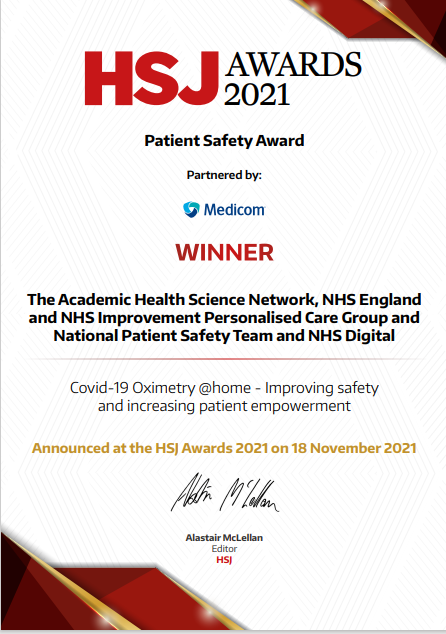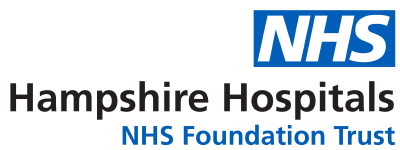IT Innovation COVID Oximetry @ Home research contributes to winning collaboration at 41st HSJ Patient Safety Award 2021.

COVID-19 has forced rapid, accelerated change within the NHS to embrace digital innovations such as remote consultation and remote monitoring. Remote interactions not only reduce infection rates by reducing physical contact but offer new ways of delivering emergency care.
A clinical service, COVID Oximetry @home (CO@h), was launched in November 2020 to support remote monitoring of COVID-19 patients in the community. The community monitoring enables early identification of patient deterioration and timely and appropriate interventions, including escalations to higher levels of acute care through hospital admissions.
Monitoring oximetry (oxygen levels in the blood) and other risk factors over the full disease trajectory, also allows for greater understanding of COVID-19 and for better clinical models to be developed.
The COVIDoximetry@home project has recently won the Health Service Journal (HSJ) Awards 2021 along with The Academic Health Science Network, NHS England and NHS Improvement Personalised Care Group and National Patient Safety Team and NHS Digital.
COVIDoximetry@home has now been rolled out nationally and clinical model adopted by the World Health Organisation, whilst the guidance for people at home to purchase a pulse oximeter published on the BBC News Website.
Professor Michael Boniface, Director of the University of Southampton IT Innovation Centre, leader of the RECOxCARE digital work stream and the University’s participation, said:
"Through collaboration with the Wessex ARC and North Hampshire Integrated Care Partnership, we supported the design of digital solutions, and our research validated home oxygen saturations as a marker of clinical deterioration in patients with suspected COVID-19 providing rapid evidence to inform policy, whilst our service evaluation has found significant association with better outcomes for patients monitored by COVIDoximetry@home”.
Professor Matt Inada-Kim, National Clinical Lead Deterioration & National Specialist Advisor Sepsis, NHS England and NHS Improvement, and Emergency Consultant at Hampshire Hospitals Foundation Trust, and honanary Professor in the Faculty of Medicine said:
"The COVID oximetry at home project has demanded very rapid, large scale collaboration between clinical teams, managers and academic partners. The University of Southampton have been critical in assisting data capture, establishing data sharing agreements and collating the evidence to rapidly stand up national policy on admission criteria in COVID and home oximetry monitoring and evaluation of its effectiveness".
"A characteristic of COVID-19 is that some patients suffer from silent hypoxia where oxygen saturation levels fall to dangerously low levels without noticeable difficulties when breathing", he adds.
The COVIDoximetry@home project was the scaled up of the NHSx RECOxCare project (Remote COVID oximetry care) project and supported by the Wessex ARC PPDRCOM project.
The University of Southampton IT Innovation Centre won a major NHSX project with North and Mid Hants Integrated Care Partnership and the Wessex Academic Health Sciences Network to deploy and scale the remote pulse oximetry in the region.
Professor Boniface and Professor Matt Inada Kim led the £500K successful NHSx RECOxCARE proposal for COVID Virtual Wards in collaboration with the Hampshire Hospitals NHS Foundation Trust (HHFT), North Hants Primary Care Network, Mid Hants Primary Care Network, South Central Ambulance Service NHS Foundation Trust, Wessex Academic Health Science Network (WAHSN) and University of Southampton IT Innovation Centre. During the project they led digital architecture and data analytics.
A research validating home oxygen saturations as a marker of clinical deterioration in patients with suspected COVID-19 (under peer review at BMJ Open) informed national policies and was critical and rapid evidence necessary to support the COVIDoximetry@home.
And the judging panel said.
“The judges felt that this was an outstanding example of a true system wide collaboration. This project not only touched the UK but positively impacted people’s lives across the world. The outcomes were positively overwhelming in relation to lives saved, bed day reduction and early admissions which improved mortality and morbidity rates. It was clear that this approach contributed heavily to the prevention of the NHS becoming overwhelmed during the pandemic. The patient testimonial demonstrated the real impact to individuals and added value to the presentation coupled with the passion and authenticity of the presenters.”
COVID oximetry @ home was the scaled up from the and supported by the . COVIDoximetry@home has now been rolled out nationally and clinical model adopted by the World Health Organisation, whilst the guidance for people at home to purchase a pulse oximeter published on the BBC News Website

